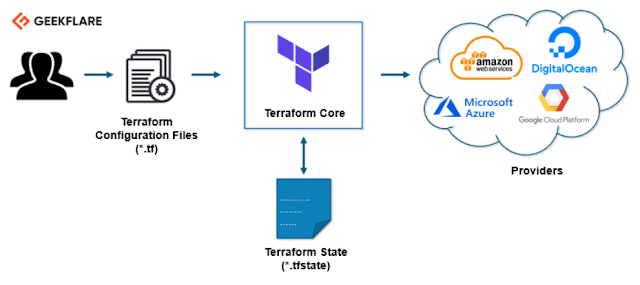21 - Terraform Lab - By Houssem Dellai
TERRAFORM - BY HOUSSEM DELLAI
- Install Terraform - Chocolatey on Windows
- https://learn.hashicorp.com/tutorials/terraform/install-cli
- https://terraform.io
- Download Azure CLI
- https://docs.microsoft.com/en-us/cli/azure/install-azure-cli-windows?tabs=azure-cli
- Create an Azure Account
- Download Visual Studio Code
- https://code.visualstudio.com/download
- Install Terraform Extension
- Download Source Code/ Template
- https://github.com/HoussemDellai/terraform-course
Deploy Infra in the Cloud using Terraform
01 - Resource Group
vi main.tf
# valid for terraform version 0.13
# provider "azurerm" {
# version = "=2.40.0"
# features {}
# }
# valid for terraform version 0.13
# provider "azurerm" {
# version = "=2.40.0"
# features {}
# }
# valid for terraform version 0.14
provider "azurerm" {
features {}
}
provider "azurerm" {
features {}
}
terraform {
required_providers {
azurerm = {
source = "hashicorp/azurerm"
version = "2.40.0"
}
}
}
required_providers {
azurerm = {
source = "hashicorp/azurerm"
version = "2.40.0"
}
}
}
resource "azurerm_resource_group" "rg" {
name = "myFirstResourceGroup"
location = "westeurope"
}
name = "myFirstResourceGroup"
location = "westeurope"
}
Commands
# Login to Azure Cloud
$ az login --use-device-code
# Login to Azure Cloud
$ az login --use-device-code
# get terraform version
terraform version
terraform version
# get terraform commands
terraform
terraform
# init terraform's Azure provider (main.tf)
terraform init
terraform init
# plan and preview terraform changes
terraform plan
terraform plan
# deploy terraform infra
terraform apply
terraform apply
# destroy infra
terraform destroy
terraform destroy
# validate syntax
terraform validate
# Formatting codes
terraform fmt
02 - Web App
** tranaform upgrade from 2.36 to 2.40
terraform init -upgrade
** create variable file
=> variables.tf
variable "resource_group_name" {
default = "example-resource"
type = string
description = "RG name in Azure"
}
variable "resource_group_location" {
default = "West Europe"
type = string
description = "RG location in Azure"
}
variable "app_serevice_plan_name" {
default = "example-appserviceplan"
type = string
description = "Ap Service in Azure"
}
** modify main.tf
resource "azurerm_resource_group" "example" {
name = var.resource_group_name
location = var.resource_group_location
.....
.....
- Overriding variable with .tfvars
** Another way to define variables
=> terraform.tfvars
resource_group_name = "example-resource"
resource_group_location = "West Europe"
app_serevice_plan_name = "example-appserviceplan"
app_service_name = "terraform-demo"
- Output variables
=> output.tf
output "webapp_url" {
value = azurerm_app_service.example.default_site_hostname
}
output "webapp_ips" {
value = azurerm_app_service.example.outbound_ip_addresses
}
03 - Execution Plan
# plan and save the infra changes into tfplan file
terraform plan -out tfplan
# show the tfplan file
terraform show -json tfplan
terraform show -json tfplan >> tfplan.json
# apply the infra changes
terraform apply tfplan
# delete the infra
terraform destroy
terraform init ----> terraform plan ----> teraform apply
main.tf .tfplan .tfstate
(changes) (current state)
Terraform State -> when working as a team and every developer working on local machines and own tfstate file. it will start conflict if working same project with own tfstate file.
Solution => Centralized location of tfstate file and every developer access same file.
Lock this file during implementation apply
How => 1. Create Resource Group
2. Create Storage Account
- RG name = terraform-rg
- Storage name = terraformrg
- location = Central US
- Peformance = standard
Storage V2 -> Locally-redundant
3. Go to Storage Account
Add - Containers
-> tfstate
4. create backend.tf file
terraform {
backend "azurerm" {
resource_group_name = "terraform-rg"
storage_account_name = "terraformrg"
container_name = "tfstate"
key = "terraform.tfstate"
}
}
5. terraform apply
Acquiring state lock. This may take a few moments
- Deploy container service ( AKS )
# plan and save the infra changes into tfplan file
terraform plan -out tfplan
# show the tfplan file
terraform show -json tfplan
terraform show -json tfplan >> tfplan.json
# show only the changes
cat tfplan.json | jq -r '(.resource_changes[] | [.change.actions[], .type, .change.after.name]) | @tsv'
cat tfplan.json | jq '[.resource_changes[] | {type: .type, name: .change.after.name, actions: .change.actions[]}]'
# apply the infra changes
terraform apply tfplan
# delete the infra
terraform destroy
# cleanup files
rm terraform.tfstate
rm terraform.tfstate.backup
rm .terraform.lock.hcl
rm tfplan
rm tfplan.json
rm -r .terraform/




Comments
Post a Comment